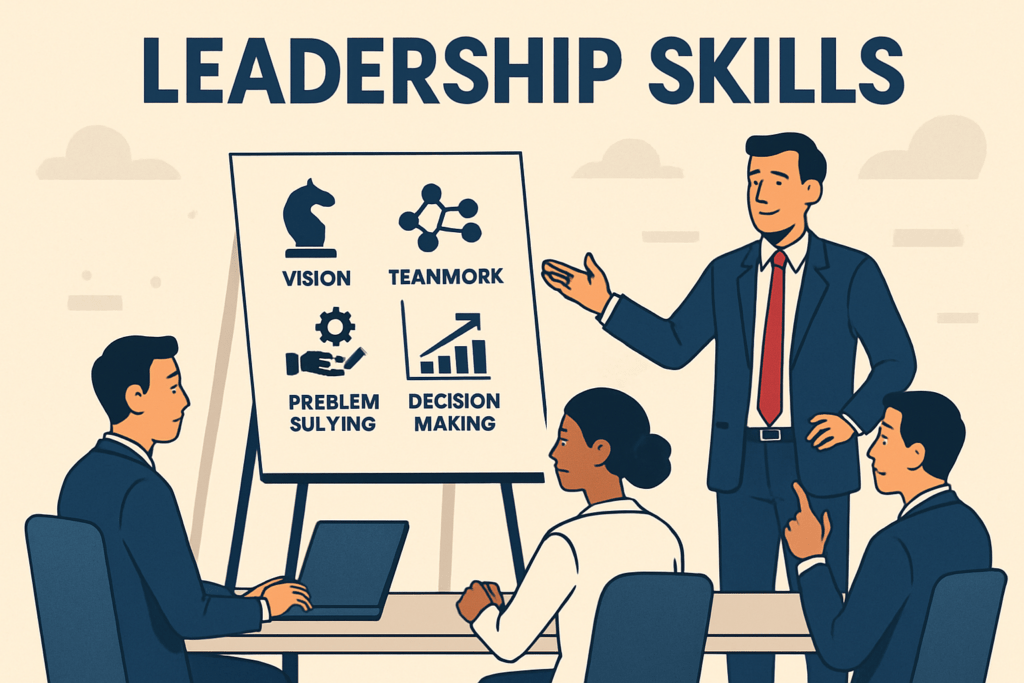Developing Essential Leadership Skills for Business: A Modern Roadmap
- Set context: why great leadership always matters in today’s business environment.
- Introduce the focus: building practical leadership skills business demands in 2025 and beyond.
- State value: sharper leadership equals better results, stronger teams, and clearer business direction.
Developing Essential Leadership Skills for Business: A Modern Roadmap
Let’s get something straight: leadership has never mattered more than it does right now. Markets move at breakneck speed, teams can span ten time zones, and the only constant is disruption. In 2025 and beyond, “good enough” leadership just doesn’t cut it—great leaders are the backbone of every company that survives, thrives, and actually inspires anyone along the way.
But what does it take to lead well today? This isn’t about inspirational posters or tired buzzwords. Modern leadership skills business truly needs are grounded in action. You’re looking at practical abilities: steering teams through change, making sharp decisions amidst chaos, and, yes, communicating so people actually listen. Stronger leadership means quicker pivots, tighter crews, and a clearer business direction. That’s how you get results—without losing your people.
Core Leadership Skills: The Non-Negotiables
Let’s get straight to the essentials. If you want to build the kind of leadership skills business demands in 2025 and beyond, these core traits aren’t optional—they’re foundational.
Clear Communication: If you can’t clearly lay out a vision or set expectations, don’t be shocked when everyone pulls in different directions. Real leaders keep it simple: what’s the goal, who’s doing what, and how does everyone know if they’re hitting the mark? Constant feedback loops—short, honest, two-way—are how you tighten the ship.
Decisiveness: Leaders can’t afford analysis paralysis. When choices pile up, the best separate signal from noise and make the call. Is it always perfect? No. But the risk of waiting is usually greater than the risk of moving. Teams crave clarity; giving it is decisive leadership in action.
Emotional Intelligence: You could be brilliant but if you don’t notice when your team’s burned out or stressed, you’ll miss the moments that matter. Leadership skills in business aren’t just about making calls—they’re about reading the room, managing your own reactions, and helping others through conflict or change.
Adaptability: The only guarantee is that challenges will surface. New tech, shifting markets, customer feedback—it all requires adjustment on the fly. Sticking stubbornly to old plans doesn’t show strength; leaders who adapt show the business how to flex and thrive.
Bottom line: these non-negotiable skills are the backbone of leadership. Every organization—big, small, startup or legacy—needs leaders who master them. Nail these, and you’ll build the leadership skills business can’t do without.
Leadership Development in Real Time
Here’s the hard truth: leadership isn’t forged in daylong workshops or by digesting books alone. You become battle-tested by actually leading—every meeting, decision, or conversation is a rep at the gym. That’s what real leadership development looks like. It’s about taking the lessons, the mess-ups, and the awkward silences and finding tomorrow’s better response.
Start with mentoring and peer feedback. Don’t just ask your boss how you’re doing—open yourself up to feedback from peers, direct reports, even outsiders. Sometimes, the best insight stings a little. You need people willing to call out your blind spots without fluff.
Next: take on stretch projects. Pick something you’re only half-qualified for and lean in. Leadership skills in business aren’t built by playing it safe. When you’re in over your head, you’ll learn three things fast: where you freeze, where you thrive, and how humility keeps you growing.
Speaking of humility, accept mistakes. Not just tolerate, but actively seek the lesson when things go sideways. The leaders who beat themselves up less and ask ‘what’s this teaching me?’ more are the ones who move up fastest. Self-awareness isn’t a buzzword—it’s the only way to turn feedback and failure into fuel.
Bottom line for leadership development: get out of the classroom and into the action. The fastest way to build trust, improve judgment, and grow your leadership skills is to show up, screw up, and keep learning.
For a deeper dive into cities brimming with leadership opportunities, check out this guide.
Expanding Management Capabilities: Beyond “Boss Mode”
Let’s get something straight: there’s a difference between being a manager and actually leading. Plenty of people can check off boxes, chase deadlines, or send out reminders—those are baseline management capabilities. Real leadership? That’s about lighting a fire in your team, not just holding their feet to it.
You want to motivate, not micromanage. That means giving your people clear direction and real autonomy. Set goals that connect to a bigger picture. Show them not just what to do—but why. Trust your team, but hold everyone (yourself included) accountable for progress. Don’t hover over every detail. Instead, step back, track progress with smart tools like project dashboards or quick team standups, and focus on unblocking roadblocks, not creating them.
Celebrate small wins. It’s easy to hammer on what went wrong, but great management capabilities hinge on reinforcing what’s working. When people know their work is valued, they double down. And when the goals get fuzzy or the going gets rough, double down on communication and clarity.
Key takeaway? Management isn’t about power plays or perfect plans. It’s about creating conditions where results—and people—can thrive. Step back, zoom out, and help your team win together.
Steadying the Ship: Setting (& Adjusting) Business Direction
Here’s the thing: leadership isn’t about charging ahead and hoping everyone follows. Real leaders set the business direction—clear, focused, and repeatable. But they don’t get stuck in neutral when the world tilts or the market zigs unexpectedly. The key lies in crafting a course your people believe in, then being gutsy enough to change tack when reality demands it.
Step one? Laser-focus the team. That means sharing the overarching goal in plain language, not corporate-speak. No one rallies behind “maximize synergies;” they move mountains for missions that feel real and urgent. It’s your job to put that flag on the hill and explain why it matters—again and again.
But business direction isn’t set-it-and-forget-it. When external shocks hit (think: sudden tech disruption, a derailed supply chain, or new regulations), don’t just react blindly. Pull the team in, explain what’s changed, and clarify the path forward—warts and all. Clarity beats perfectionism every time.
The strongest leaders over-communicate during a course change. Skip the twelve-slide decks; use transparent, direct updates through standups, one-on-one check-ins, and simple written recaps. Show confidence in the new plan, acknowledge uncertainty, and let your conviction steady the crew. A clear business direction, flexed when needed, is how you keep the ship upright and moving, no matter the storm.
What Happens After Winning Millions?
Winning a life-changing lottery jackpot is every player’s dream, but few are prepared for what comes next. The sudden influx of wealth can bring excitement, but also a wave of challenges. Managing newfound wealth becomes a major task, with decisions about taxes, investments, and spending habits looming large.
Navigating Financial Decisions
After the initial shock of winning, several key financial challenges arise:
- Tax Obligations
- A substantial portion of winnings is typically reserved for taxes.
- Legal guidance is often necessary to navigate tax implications.
- Investment Opportunities
- Some winners hire financial advisors to ensure a stable financial future.
- Others may fall into reckless spending, risking their financial stability.
- Long-term Planning
- Without proper budgeting, even the largest fortunes can be depleted quickly.
Lifestyle Changes and Social Dynamics
Winning millions can drastically change one's lifestyle almost overnight:
- Luxury Purchases
- Many winners invest in luxury homes, exotic cars, and extravagant holidays.
- Social Interactions
- Friends and distant relatives may emerge, hoping to benefit from the winnings.
- Media attention and social pressure can become a burden for the winner.
Some winners choose to embrace their newfound wealth with openness, while others opt for a more discreet life to avoid pressure and public scrutiny.
Philanthropy and Legacy Building
Beyond personal gain, many winners choose to make a positive impact with their wealth:
- Charitable Contributions
- Donations to various causes can become a priority for many winners.
- Community and Business Investments
- Winners may fund scholarships, launch nonprofits, or support local businesses.
Many strive to transition from wealth beneficiaries to philanthropists, demonstrating how riches can contribute to broader societal benefits. However, a lack of planning can still lead to financial downturns, underscoring the importance of prudent financial management.
Navigating the Emotional Impact
Beyond financial and lifestyle changes, winning millions can trigger significant emotional shifts:
- Euphoria and Anxiety – The initial excitement is often accompanied by stress over managing such a significant sum.
- Isolation – Some winners report feeling alienated from friends and family who don’t share their newfound status.
- Identity Shift – Adjusting to life as a wealthy individual can bring its own set of identity challenges and self-perception issues.
Ultimately, the way winners navigate these emotional dynamics can heavily influence their overall well-being post-win.
The Importance of Planning
Proper planning can make the difference between lasting wealth and swift financial decline:
- Creating a Financial Plan – Engaging professionals to develop a comprehensive financial strategy ensures that winners can sustain their wealth over the long term.
- Setting Boundaries – Establishing clear boundaries with acquaintances and relatives can help manage expectations and reduce stress.
- Personal Development – Investing in personal growth and education about financial literacy can pave the way for informed decision-making.
Real-Life Examples
Success and cautionary tales abound when it comes to handling lottery winnings:
- Triumphs: Winners who invested wisely, remained grounded, and prioritized philanthropy often sustain their success.
- Challenges: Those who neglected financial advice or succumbed to external pressures often face financial difficulties.
Studying these real-life examples highlights the diverse paths and outcomes that lottery winners can experience, serving as both inspiration and warning.
By understanding these facets of sudden wealth, potential winners can better prepare for the life-altering changes and decisions that follow hitting the jackpot.




